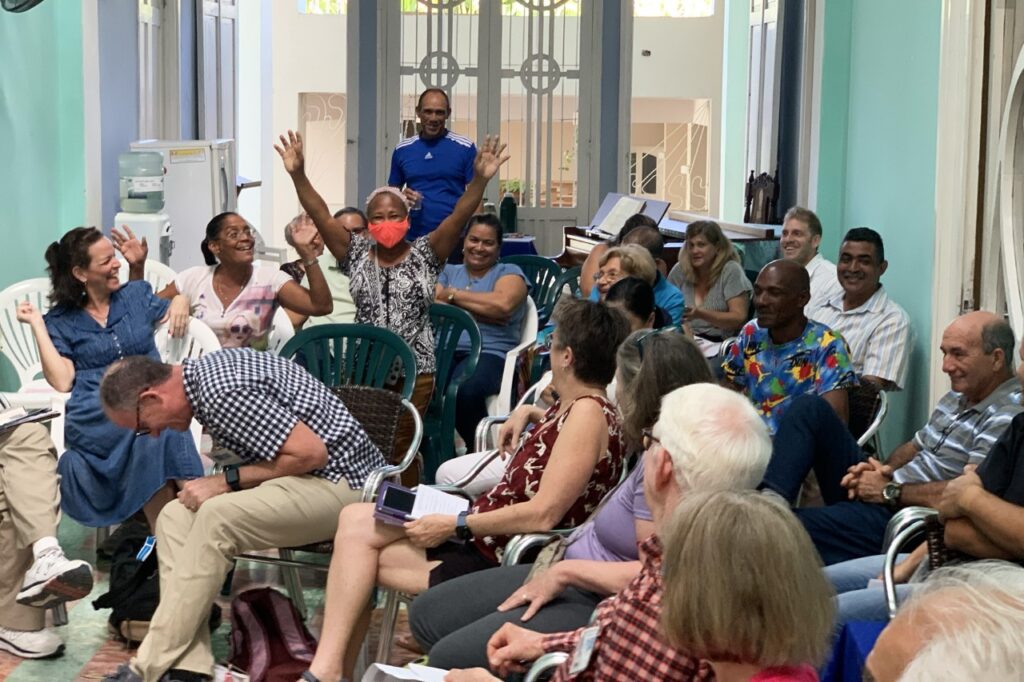UCC Study Seminar participants view Cuba through Biblical lens
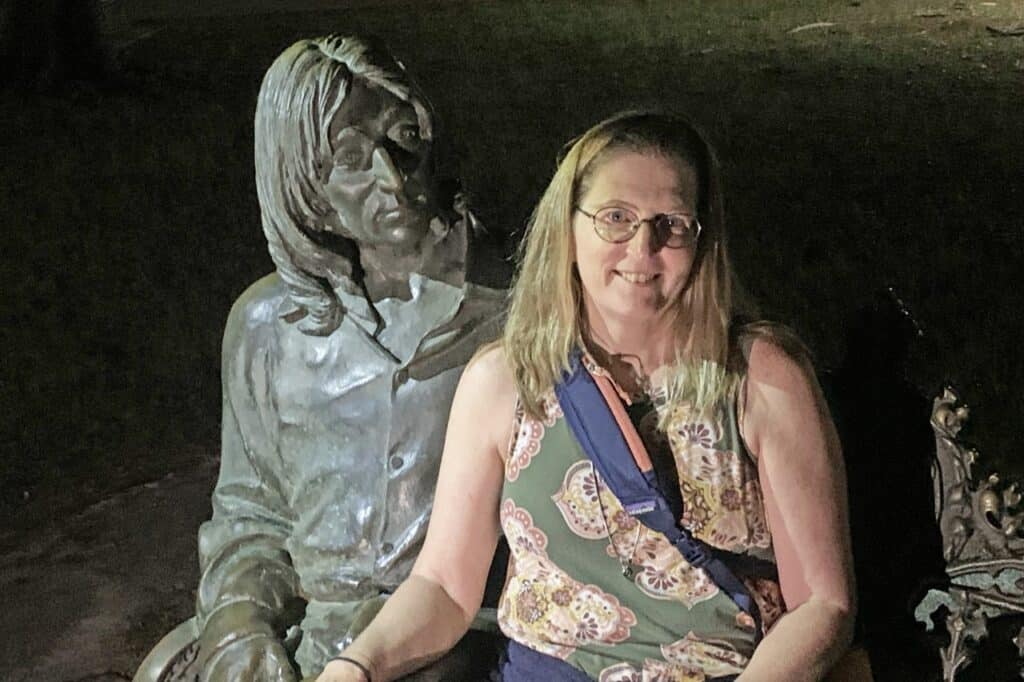
“They say that I’m a dreamer, but I’m not the only one,” say the words of John Lennon, etched into a sidewalk in Havana, Cuba. Looking up from this inscription, one sees a statue of Lennon settled in a park next to Submarino Amarillo — “Yellow Submarine” — nightclub.
Seventeen people joined the pastor of a Greensboro, N.C., United Church of Christ congregation on a tour of the island in February as part of the UCC Cuban Study Seminar. The 2023 tour, led by Peace UCC’s Rev. Tom Warren and his spouse Kim Miller, set out to explore why a revolutionary initiative by Fidel Castro captured the hearts and minds of Cuban people, and why the United States embargo, viewed as a blockade in the eyes of Cubans, prohibits two neighboring countries from commerce some 60 years after the Bay of Pigs invasion.
A quote at the Literary Museum entrance in Havana highlights the “dreamer” side of Fidel Castro in the wake of the revolution. The museum’s long-time director, Louisa Campos, offered a translation. “Cuba,” Fidel said in 1959, “will be the first country in the Americas to get rid of illiteracy.”
“To accomplish this task,” said Campos, “Fidel called out educators in the cities to go to the mountains, where the illiteracy was highest.”
In the first year, he nearly achieved his goal, reducing the illiteracy to somewhere just over 20 percent, while countering the loss of many professionals who left the country. Castro envisioned Cuba offering a model for the world, particularly in Africa and Latin America. In the areas of education and health care, Cuban officials take pride in highlighting their country’s successes.
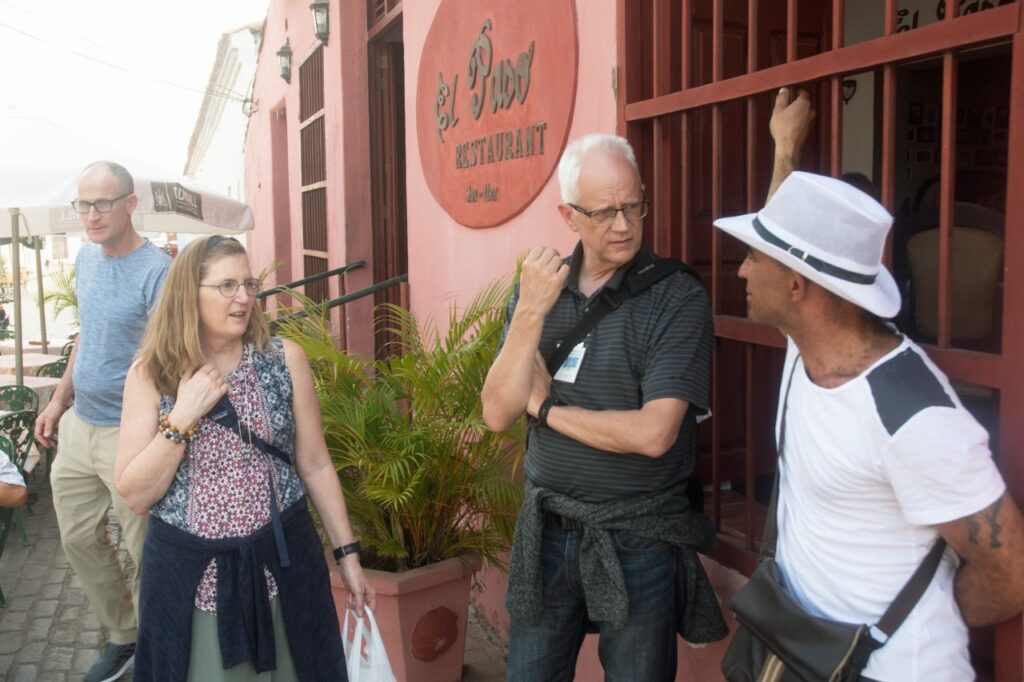
Revolutionaries engage to re-direct power
On day two of the Cuba immersion, participants met in the dining room of Plus Vedado 500 Hotel in Havana. The Rev. Clint McCann, professor of biblical interpretation at Eden Theological Seminary and a member of the group, engaged travelers in a bible study of Genesis 1 and 2.
Acknowledging the text’s difficult word — dominion — he highlighted for the group as they were eating breakfast that the word “seed” appears in the first Genesis chapter six times. “Seed,” he suggested, “is a reminder of what one will eat in the coming year.
“Dominion then, in this Biblical context, is about survival.”
McCann said that the Bible seeks to redirect power. “The gift of dominion is God’s great risk, so that Love is possible.”
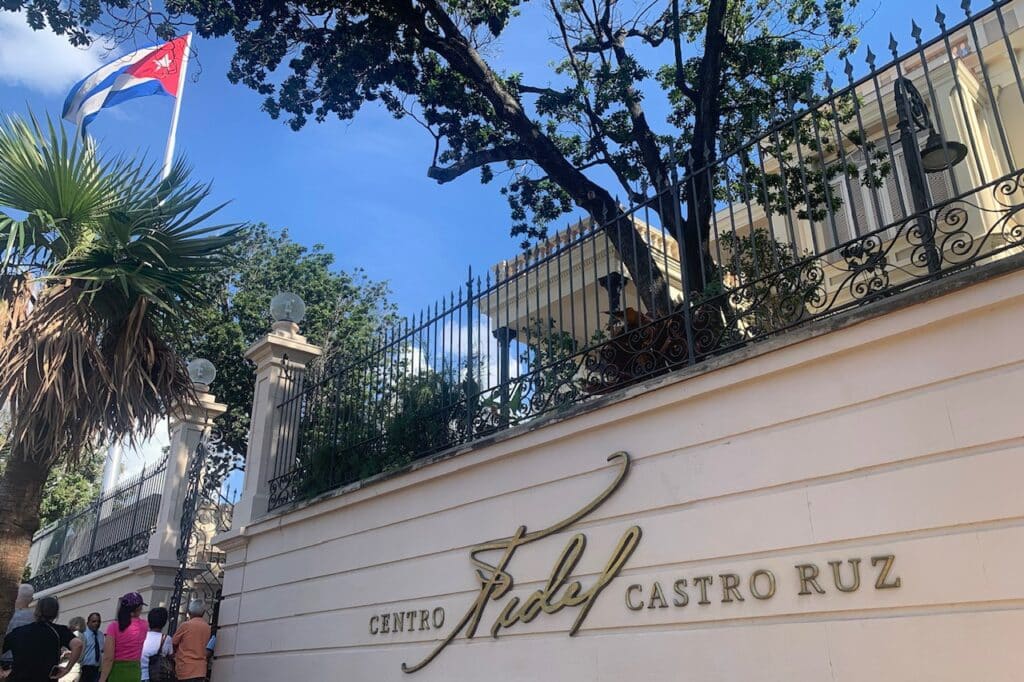
From a Cuban perspective, the revolution was also about re-directing power. Cubans had experienced enough of what they describe as the U.S. imperial power that had maintained dominion over them with its capitalistic corporate profit motives.
“As a scholar who has traveled numerous times to Cuba,” writes Aviva Chomsky in A History of the Cuban Revolution, a recommended read for the seminar participants, “I am a strong opponent of U.S.-imposed travel restrictions. As a Latin Americanist who has studied and witnessed the deleterious effects of U.S. policies and foreign investment in countries such as Nicaragua, Haiti, and Colombia, and especially on the poor in those countries, I cannot help but admire the audacity of a government, and a country, that has tried to invent a radically different path to economic development, and has openly challenged U.S. imperialism in the hemisphere.”
Seminar participants heard the sentiment of Chomsky’s words voiced by various Cubans in the course of their travels.
‘Give us this day, our daily bread‘
The morning news on Feb. 16, the seminar’s seventh day, reported presence of a freighter in the Havana harbor carrying 25,000 tons of wheat from Russia. “Without that shipment,” said McCann in the daily Bible study, “there would be no bread in the coming days.”
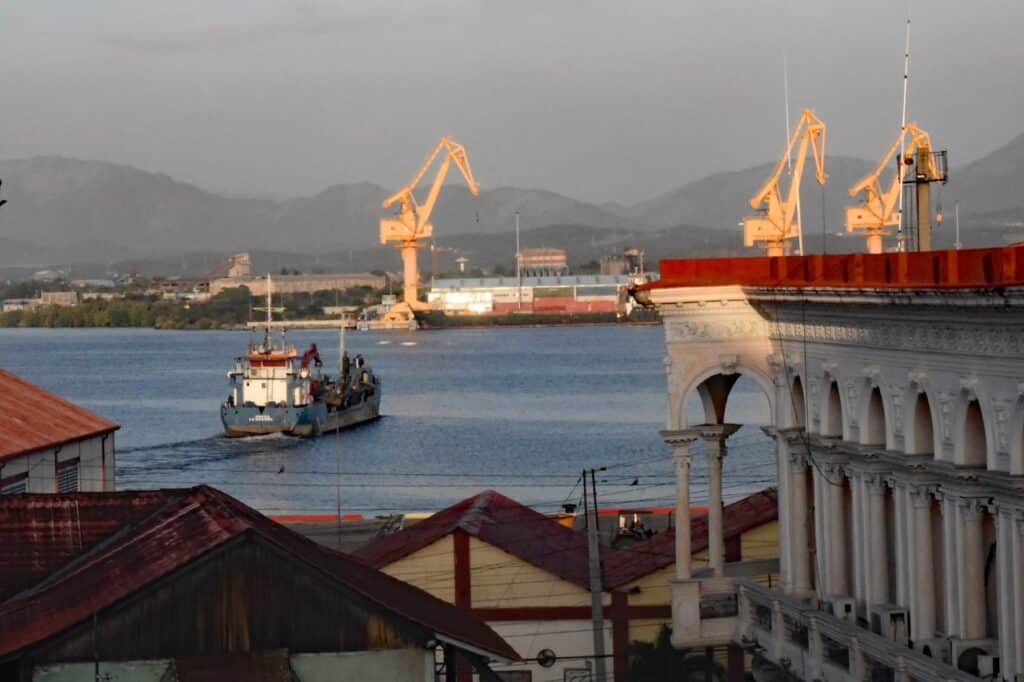
The day before Reuters reported that “Russia gave Cuba the ‘emergency’ donation of 25,000 tons of wheat to combat shortages on the island, a sign of deepening ties between the two long-time allies. … The substantial donation of wheat — used to make the bread that is a basic, government-subsidized staple in Cuba — marks the latest overture between the communist-run island and Russia.”
Psalm 72 from The Green Bible appeared on McCann’s syllabus for that day:
May the mountains yield prosperity for the people … give deliverance to the needy and may peace [shalom] abound.
“Shalom [peace] begins with food, having food,” said McCann.
Javier, the group’s Cuban tour guide, planted a seed for the seminar group as they boarded the bus that morning. “Cuba would like to buy wheat from midwest U.S. farmers,” he said. “The U.S. economic embargo and travel ban have been in place since 1960, posing harm to both countries.”
The United Nations, supporting Cuba’s position, voted overwhelmingly in November 2022 to condemn the American economic embargo of Cuba for the 30th year.
Gospel work calls for chipping away at walls
The study seminar has been taking visitors to Cuba for more than 40 years. When Rev. Warren asked the tour guide what good it does, he replied without hesitation, “You bring 17 people, each of whom can put a chip in the wall. You offer hope that one day, with enough chips, it can fall.”
Travelers remembered the Berlin Wall, and a day when few could imagine its crumbling. The Cuban Institute of Friendship with the People (ICAP), responsible for the group’s schedule and ground transportation, by its own established principles, sets out to connect people with the rest of the world.
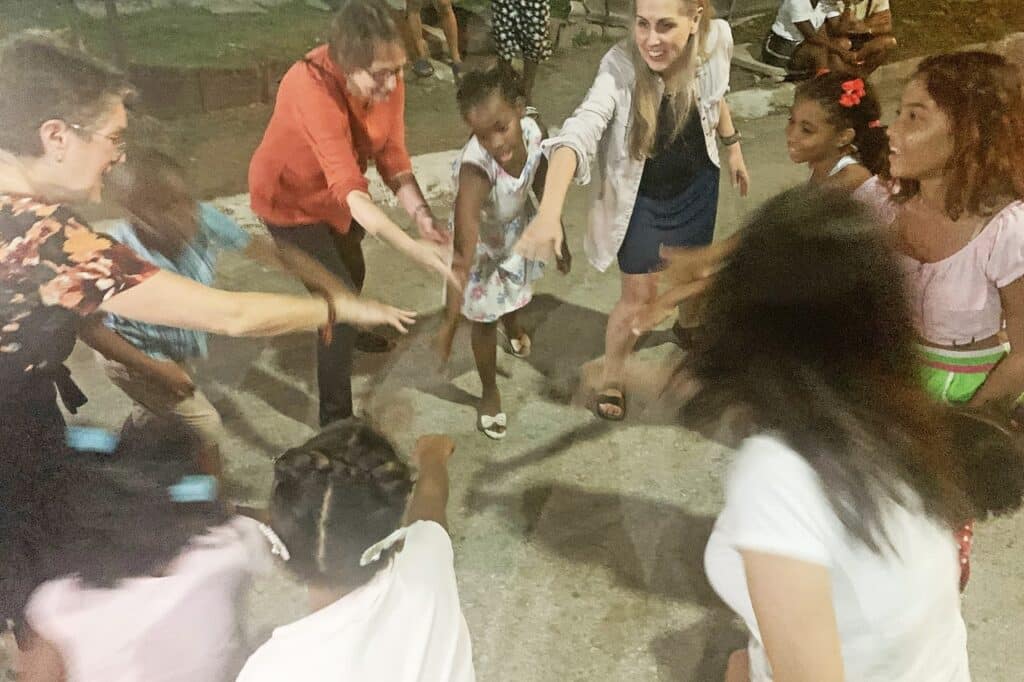
ICAP planned a block party for American visitors, after dark and deep in a Santiago neighborhood. Arrangements had been made to meet a representative from the neighborhood, who would guide bus driver Fernando to the remote designated street. The hosts shared music, prompted dance, offered refreshments and words of welcome. The Americans offered gifts, smiles and expressions of gratitude.
And while adults found themselves gathered around a hospitality table, a circle spontaneously formed at another corner of the street, dominated by children, but receptive to visitors who had left their adult inhibitions on the bus. Music became the universal language, with dances led by Cuban children who helped crack open the invisible wall on the street. As in Isaiah 11:6, “a little child shall lead them.”
A lesson in the ‘cost and joy of discipleship‘
“While they [U.S. and Cuba] are fighting each other, there is also deep love between us,” said the pastor at Ebenezer Baptist Church in Havana, referencing the ongoing blockade, when the U.S. visitors stopped to mingle with church members. “That [love] is very important to us. It is important for us to get together and to know each other.”
People often ask if the Cuban government allows religion. The answer heard by the Study Seminar participants resounds with a definite “yes.” U.S. travelers worshiped openly at Ebenezer Baptist Church in Havana. The Rev. Elmer Lavastida of Santiago, who had been imprisoned after the revolution for three years — ministers were suspected as counterrevolutionaries — went on to serve three parishes in Cuba. His wife, the Rev. Gisela Perez, served with Elmer as co-pastor of Second Baptist Church in Santiago, and director at the Lavastida Center for Christian Values and Training in Santiago, prior to their retirements.
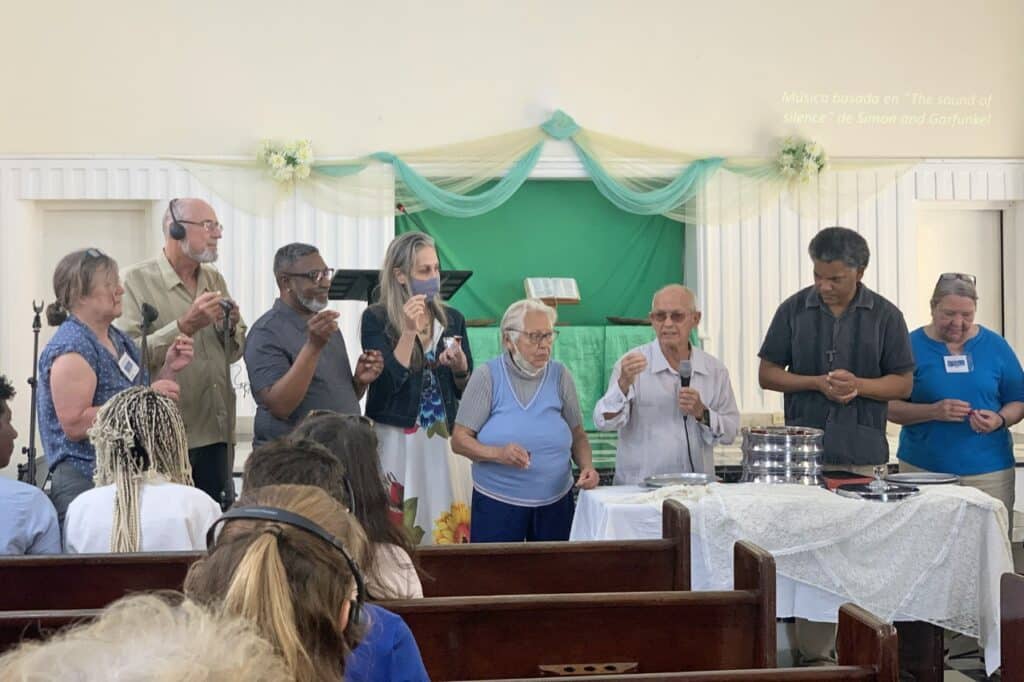
In a History of the Cuban Revolution, Chomsky writes, “The 1976 Constitution declared Cuba an atheist state and the Communist Party banned religious believers from membership. At the same time, though, it guaranteed ‘freedom of conscience and the right of everyone to profess any religious belief.’” The Lavastida family said religious gatherings are widespread and often take place in house church settings.
Elmer Lavastida also acknowledged the presence of a wide spectrum of theological perspectives represented on the island.
The Rev. Raúl Suárez, introduced in Chomsky’s book as a young Baptist minister in eastern Cuba, “joined in the defense effort during the exile invasion at the Bay of Pigs in 1961. He went on to take a position as the Vice Rector of the Baptist Seminary in Havana, where he had himself studied, and, in 1971, became Pastor of the Ebenezer Baptist Church — named after the Reverend Martin Luther King, Jr.’s congregation in Atlanta — in the heavily Afro-Cuban Havana neighborhood of Marianao. In the 1980s, he became Executive Secretary of the Cuban Ecumenical Council.”
Now retired, Suarez was present at the Feb. 9 worship service attended by the Cuba Study Seminar and participated as a communion celebrant.
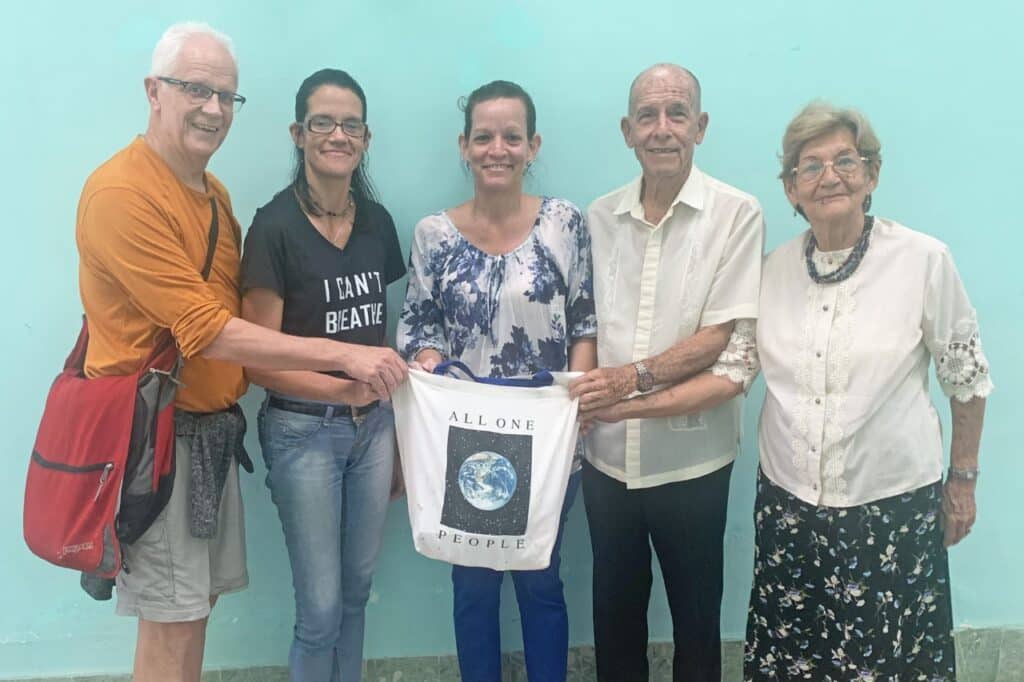
Global Ministries, the common overseas ministry of the UCC and the Christian Church (Disciples of Christ), have ecumenical partnerships in Cuba that go back decades. Most recently, that relationship has been affirmed through continued participation in the UCC Cuba Study Seminar, with an 18-month Global Ministries initiative in 2017 that focused on Cuba and six other countries in Caribbean and with a 2017 General Synod resolution, “Bring Down the Wall,” advocating for an end for the U.S. embargo.
The Rev. C.L. “Curly” Stumb, the editor of the Southern Conference United Church of Christ e-Newsletter, participated in the seminar for the second time in seven years.
Content on ucc.org is copyrighted by the National Setting of the United Church of Christ and may be only shared according to the guidelines outlined here.
Related News
A Prophetic Call for Justice and Peace in Palestine
The executive leaders of the United Church of Christ have issued the following statement...
Read More‘Love is Greater Than Fear’: Regional Youth Events get to the heart of gospel message
United Church of Christ teens attending this summer’s Regional Youth Events (RYE) are...
Read MoreUCC desk calendars available to order now
Prepare for your day, month and year with the United Church of Christ desk calendar —...
Read More